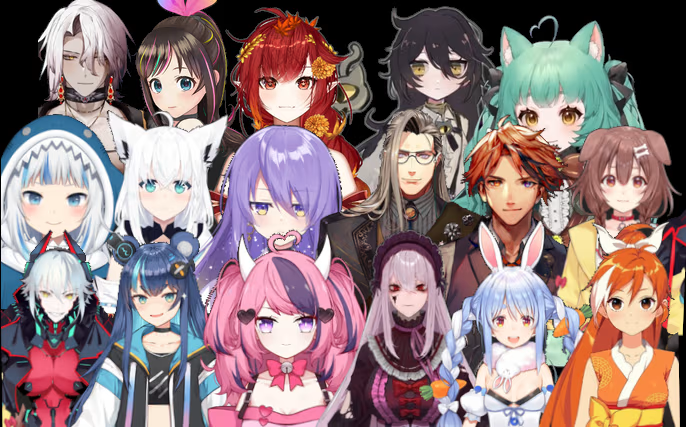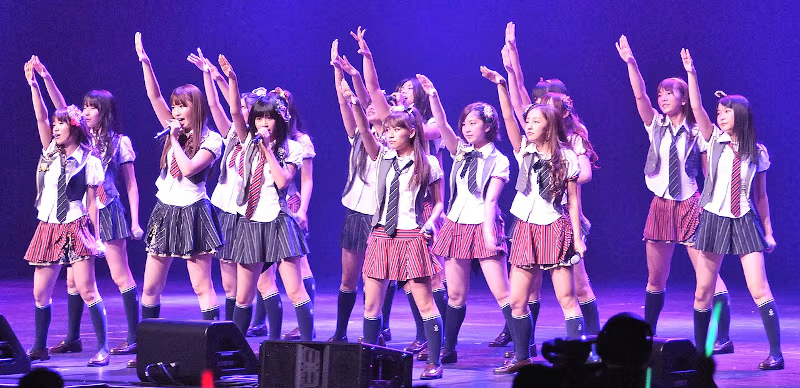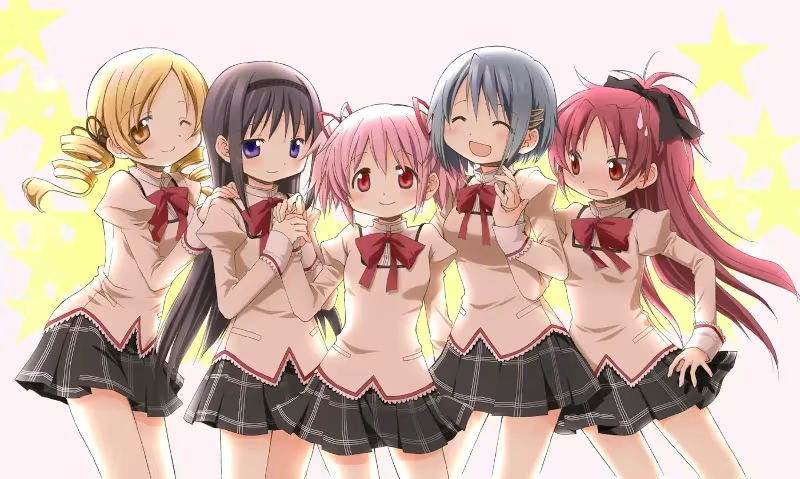Graduation ceremonies of Japanese VTuber idols feel borderline sadistic. I was watching a particularly poignant graduation that dragged on so long it broke my immersion for a second. And in that moment I was impatiently questioning when the stream was going to end. It felt like the organizers were trying way too hard to make all the viewers cry. Then I realized that this is probably more accurate than you’d think, especially through the contextual lens of Japanese culture.
Wait, Japan? VTuber? Graduation?? Sadistic!? What the fuck are you talking about
Whoa, whoa, whoa, ok let me back up a little. I think I should explain what a VTuber is first.
What the fuck is a VTuber?
A VTuber is a streamer or youtuber who uses a cartoon anime avatar instead of filming themselves directly. They use special software that tracks their facial expressions and maps it onto a moving image or 3d model so it appears like the cartoon is mimicking what the actual person is saying and emoting.

Here are some popular VTubers:
What does graduating have to do with VTubers?
“Graduating” is a common euphemism to refer to when a VTuber stops streaming. This usually is only said about Japanese VTubers. This is because the VTuber model in Japan is taken from the music industry Jpop idol model.
Japanese music idols are usually said to “graduate” instead of quit or retire because early on, many groups had a “high school club” feel to them. Additionally, many members who left their bands ended up pivoting into completely different careers, such as dentistry, and teaching, so the term “graduation” came to be widely used as a sort of inside joke. Typically, a Japanese idol graduation involves a swan song of singing and dancing, talking to their fellow groupmates and fans one last time, and thanking everyone for the time they spent together.

One of the biggest VTuber agencies, or “corpo” in internet speak, in Japan is Hololive. While VTubers can be independent, there are big companies that employ VTubers under a unified umbrella so they can pool resources. And Hololive is probably the biggest VTuber corporation at the moment. Hololive applies the traditional Japanese idol model to their VTubers, so naturally their VTubers follow traditions from the music industry rather than acting more like western Twitch streamers.
Graduation ceremonies in the context of Japanese school culture
My knowledge of Japanese graduation comes from Gaijin Smash, which was a popular blog many years ago written by an English language teacher in Japan. There is a post exactly about graduation ceremonies.
I think I mentioned last time that Japanese graduations are designed to make you cry uncontrollably. While that’s still all true, there’s one important aspect I totally forgot – they’re also designed to bore you into a catatonic, vegetable-like coma.
Facetious and overly-cynical tone aside, I believe they are very accurate. In a blunt way, a lot of Japanese traditions (and, to be fair, traditions in general) mean people just go through the motions solely out of obligation to hit on all the token features or fanservice to satisfy the tradition. This phenomenon has a name.
Post-Modernism in Japanese Culture
Crying is a big deal in Japanese culture, but it goes deeper than that. Modern Japanese culture is heavily post-modern, meaning that the evocation of nostalgia for the past is common among Japanese traditions. The term “post-modern” not only means nostalgic reminiscing of the past, but looking back at events with rose-tinted glasses. And not necessarily at the reality of how things were, but an idealized, possibly fictional version of those things.
For example, half of the Metal Gear Solid series is just remaking the same plotline over and over again. Each game needs its young hero, a grizzled mentor, an army Colonel, a cyborg ninja, and a giant robot. It’s a pastiche of 80’s action movies and military nostalgia. Lots of other Japanese video games and things do this too. Japan also has a KFC Christmas tradition, which is supposed to mimic American Christmas, but obviously that never happened this way.

So what does that look like when you apply it to graduation ceremonies? Well, maybe some people are nostalgic about school, since it could have been the best years of their lives. And when you think of graduations, there’s a sadness in the finality of it. A loss of childhood, a change in community, and time you’re never going to get back. So when you think of graduation, what do you think must happen? That’s right, crying. Lots, and lots of fucking crying.
So to go back to my previous point, if we break down graduation into its post-modern pastiche and need to hit all the key milestones, that means everyone must cry during the graduation for people to consider it a successful celebration of tradition. Naturally, Hololive subscribes to these tendencies as well and you can bet that they are going to make this post-modern as fuck.
Japanese Corpo VTuber Graduations
In TYOOL 2025, there were a whole bunch of high profile VTuber graduations within a very short span of time. I believe in Hololive alone, there were four or five people who left, mostly of them clustered within the same week span at the end of April, including that of the highly popular Gawr Gura*. No doubt that many of fans were really upset over so much bad news hitting basically all at once.
*In case you were wondering, those graduations were:
- Ceres Fauna (January 3, 2025)
- Murasaki Shion (April 26, 2025)
- Nanashi Mumei (April 28, 2025)
- Gawr Gura (May 1, 2025)
Most of these graduations follow the same formula, starting with a thumbnail so iconic that people started calling it the “5 mph wind”. Seeing this particular style of thumbnail became associated with a very specific announcement.

The graduation announcement video is usually very short and done only with a pre-recorded voiceover. During the video, the talent “breaks kayfabe” while announcing their resignation and the terms in which it is happening. Once that happens, there is approximately a month left to really build nostalgia and feelings until a final stream activity which is a group activity where all the talents coworkers and friends call in and reminisce. Once that is done, there is a last “3d graduation live” show where the talent sings some songs in full body motion tracking. Each stage of the performance meticulously design to prolong and evoke tears for maximum sadness.
For Hololive English 2nd Generation VTubers, Nanashi Mumei, and Ceres Fauna, this was certainly the case.
Mumei did a particularly long marathon stream where she was able to talk to every other member of the Hololive English branch for the last time. I imagine for the hardcore fans, this became an all-day affair, watching this entire 5 hour stream.
Fauna, on the other hand has a farewell stream that is consolidated into one event and clocks in at a relatively modest 2 and a half hours.
However, for Gura specifically, she was such a popular VTuber, that they made her graduation ceremony extra special. She and all of her generation mates went through a relay stream, a cumulative total of 4-5 hours of old friends playing games and having fun with each other for the last time. After the relay, came a 3d song performance, plus a special message for the fans at the end. And then an extra special animation of her packing her things and leaving her room and swimming into the ocean. This is finally topped off by calming, sad music and a backdrop with a special congratulatory message. Goddamn, if you aren’t in tears by this point, you’re a freaking monster.
Gura’s graduation ceremony was the epitome of what I am talking about. Look at how many different phases her graduation ceremony was. They tried damn hard to evoke pathos in everyone participating. And I don’t mean just the audience. Gura herself broke down during her own song, for crying out loud! Part of me is somewhat annoyed by the overt artificiality of this conceit, and yet part of me is glad this happened, because Gura was super beloved and it’s great that we can memorialize her existence with something special.
Contrast this with how VShojo does things
On May 5th, less than a week after Gura’s graduation, another VTuber by the name of Matara Kan left VShojo (another corporation, but with western management). In a surprise announcement, this news story was dropped with no fanfare whatsoever and barely any ceremony. The way Matara and VShojo talked about in their announcements was all business.

Granted, this seemed to be more of a lay-off or termination, but none of the other VShojo “graduations” had very much fanfare either. I put the word “graduations” in quotes, because VShojo, being a western company, doesn’t do all the make believe that the Japanese VTuber corpos do. VShojo and their VTubers act more like western streamers.
What is unique about VShojo is that all the talents retain ownership over their VTuber avatar and character IP. So not only did Matara Kan quit, but there would be no interruptions to her streaming schedule, or any visible differences to her activities before or after the split. The completely different nature of this event offers further contrast into the cultural differences between streaming agencies.
This juxtaposition really just shines a light on this interesting phenomenon, which is that certain VTubers (Japanese idol style ones) evoke a disproportionate amount of emotion around their coming and going. And it is pretty obvious that this can be manufactured. This is a double-edged sword.
The sadness of being a VTuber
The lifespan of a VTuber’s career is very short, even more so than that of a flesh-and-blood streamer. This emphemeral-ness of VTuber idols remind me of the magical girls from Puella Magi Madoka Magica.
In this dark anime, the magical girls are all essentially doomed. They enter into a contract that curses them to protect the world from now until the end of time. Each victory grants them a temporary reprieve, but there is no end to the battles, leaving them to fight until their hopelessness overcomes them.

I feel like VTuber idols sometimes end up in a similar situation. They are powered by nostalgia and hope–strong emotions of everyone involved. It is the driving force of their popularity, what fuels the zealotry of their fanbase, but all this comes with a steep price. The sheer time demand of streaming, along with the stress of being in the public eye, and dealing with corporate life means that they usually do not last longer than a handful of years. Japanese idol culture adds additional pressure to the streamer to not let everyone down by quitting. Ironically, this just makes the graduation all the more sad for everyone.
And then…! Later another VTuber debuts and all their new fans automatically know to brace themselves for sadness in the near future, like a family that just adopted a dog, in morbid anticipation for the VTuber’s inevitably imminent departure. And, thus, the cycle begins anew.
And the kicker…
Okay, so here’s the thing. Shortly after most of these VTubers graduate, the streamers behind the persona end up continuing their streaming activities under another alias. So what was all the ceremony, all the pomp and circumstance for?? NOTHING!
As described in detail in the body of this post, heavily post-modern Japanese idol culture really draws out a VTuber’s retirement and blows it up into this big event that puts the talent on display for hours in some exhibitionist display of crying mostly for the benefit of the audience members. And that, to me, is what really highlights the sadistic part of it all. VShojo showcasing a more low-key version of events, coupled with the fact that the content creator will come back soon with slightly different window dressing, makes it really obvious how outsized the response to a graduation is. Thus, if you think about it, both the talent and the fans really suffer more than they have to.
I wanted to write this post to highlight the mechanisms and forces at work behind this phenomenon. This cultural exchange has fans experiencing their own version of Disney magic. For better or for worse, following a VTuber idol becomes more meaningful than it would be otherwise, the downside being that having so much emotional investment in a streamer makes goodbyes and reality more painful than it normally would be. However, despite using the term “sadistic”, I find that there is no malicious intent behind this, rather a sincere attempt to make things special by adapting celebration traditions to streaming; What I saw instead was that a mixture of Japanese Idol traditions and streaming end up producing a novel, multi-cultural experience in the electronic space of the 21st century.

